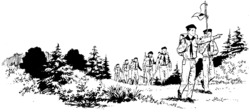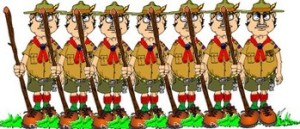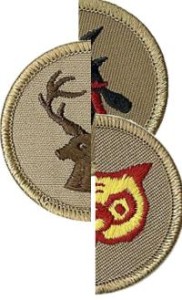 Suppose that instead of a usual weekend campout, the Scouts of your troop have decided to go on a weekend hike – maybe to get a taste of what a longer voyage like a Philmont trek might be like.
Suppose that instead of a usual weekend campout, the Scouts of your troop have decided to go on a weekend hike – maybe to get a taste of what a longer voyage like a Philmont trek might be like.
They’ll start out by getting dropped off Friday night, hike to their first campsite, set up and camp overnight. Then in the morning they’ll have breakfast, pull up stakes and hit the trail. Lunch is enroute, then arrival at a second site Saturday evening, where they’ll set up again, cook dinner, have a campfire and turn in. After Sunday morning’s breakfast, they’ll break camp and hike to where the parents are waiting to pick them up.
This requires not only a good amount of planning but some training, so the Scouts will know what to expect and what to plan for. Continue reading “Adults teaching Scout skills”


 While helping a couple Cub Scout packs in my district with their rechartering this fall, we were trying to figure out how to juggle the few adult volunteers so that all the positions are filled. The Cubmaster doubles as the den leader for his son’s den (definitely not a recommended practice). They still needed an official den leader to satisfy the requirement to have at least one, so one of the den’s parents was “drafted” to be a DINO – Denleader In Name Only. The chartered organization representative doubled up as a committee member so there would be the minimum of three.
While helping a couple Cub Scout packs in my district with their rechartering this fall, we were trying to figure out how to juggle the few adult volunteers so that all the positions are filled. The Cubmaster doubles as the den leader for his son’s den (definitely not a recommended practice). They still needed an official den leader to satisfy the requirement to have at least one, so one of the den’s parents was “drafted” to be a DINO – Denleader In Name Only. The chartered organization representative doubled up as a committee member so there would be the minimum of three. A commenter on a story in The New York Times made the observation:
A commenter on a story in The New York Times made the observation: As a unit commissioner and Friends of Scouting presenter, I have the opportunity to visit many troops and packs and get insight into how they operate. We commissioners also talk among ourselves about problems and issues in our units.
As a unit commissioner and Friends of Scouting presenter, I have the opportunity to visit many troops and packs and get insight into how they operate. We commissioners also talk among ourselves about problems and issues in our units. On one of his first episodes of the
On one of his first episodes of the